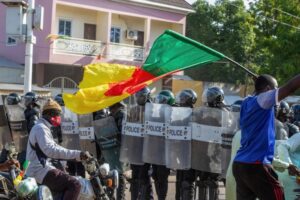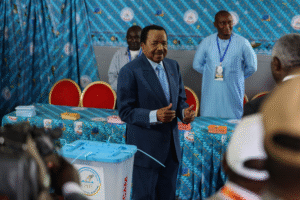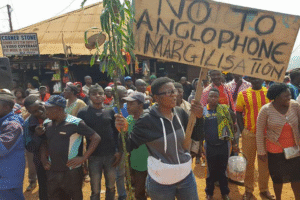RFK Human Rights strongly condemns the attacks against peaceful protesters in Cameroon following the country’s presidential elections. We call on authorities to refrain from their attacks on their citizens and stress that authorities must act in accordance with their constitutional and international obligations. Further, authorities must investigate all claims of arbitrary detention, excessive use of force, and other rights violations perpetrated by security operatives of the State.
On October 27, 2025, Cameroon’s Constitutional Council declared that 92-year-old incumbent President Paul Biya had been re-elected to the presidency following the October 12 elections. However, prior to this declaration, on October 14, opposition leader Issa Tchiroma Bakary declared himself the winner of the election and urged President Biya to “accept the truth of the ballot box” to avoid plunging the country into turmoil. Tchiroma claimed to have won 55% of the vote based on returns from 80% of the electorate. Tchiroma’s claim was quickly rebuffed by government officials, who insisted that the result of the election could only be proclaimed following the Constitutional Council’s decision.
Since the October 12 election, the country has experienced a wave of protests, which the government has violently repressed. Protests have erupted in Yaoundé, the country’s capital, Douala, the country’s largest city, and other cities across the country. Using tear gas, water cannons, and even live ammunition, the disproportionate response of the security forces has left at least 23 Cameroonians dead, dozens injured, and hundreds more arbitrarily arrested. Government authorities have stated that many of these protesters will be tried before a military tribunal, contrary to international human rights law standards. Internet outages have also been reported across the country, hindering access to information and communication avenues during this crucial period.
“The right to peaceful assembly is integral to the practice of democracy and must be protected by the State, especially in a high civic engagement period such as elections,” said Ikechukwu Uzoma, senior staff attorney at RFK Human Rights. “Attacks against civic space, including through violence and internet shutdowns, are an indictment of the integrity of the elections. The people must have the space to speak,” he added.
President Paul Biya has been Cameroon’s president since 1982, making him the longest-serving head of state, a tenure facilitated by his 2008 abolition of term limits. Under Biya, Cameroon’s economy has stagnated, and the country has struggled to deal with corruption and the Anglophone crisis. The government has also increasingly cracked down on dissent and citizens’ freedom of expression. Past presidential elections have led to waves of protests and violent repression, particularly in 2018 and 2019, after the arrest of opposition candidate Maurice Kamto after he claimed victory in the elections.
RFK Human Rights calls on the Cameroonian authorities to immediately cease all acts of repression, release all those arbitrarily detained, and uphold the fundamental freedoms of assembly, expression, and participation. The will of the people can only be honored when dissenting voices are heard, not silenced through violence.




